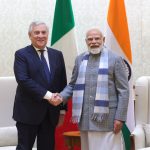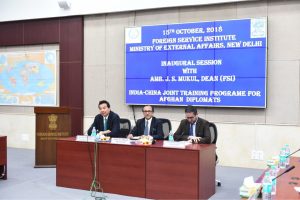
The seeds that were sown during the Wuhan meeting between the leaders of India and China six months ago have now blossomed into the first joint project between the two Asian partners in Afghanistan. The first India-China joint capacity building programme in Afghanistan, focused on training of 10 Afghan diplomats, began simultaneously in New Delhi and Beijing on a high note on October 15.
“Guided by the vision of ‘Sabka Saath Sabka Vikas’, the Indian Government has embarked on an ambitious development partnership programme with commitment of over US $ 3 billion. This has four broad pillars: building infrastructure; developing human resource; enhancing connectivity; and promoting trade & investment links. India-Afghanistan Friendship dam in Herat, Parliament Building in Kabul, operationalization of Chabahar port are prominent symbols of this partnership,” said Mrs Swaraj.
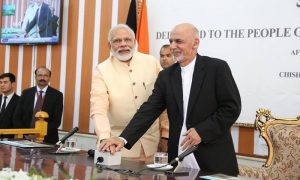
The joint training in Afghanistan is part of the broader “China-India plus” cooperation in third countries that was firmed up during the defining meeting between India’s Prime Minister Narendra Modi and Chinese President Xi Jinping in the picturesque city of Wuhan in April. The Wuhan consensus has imparted a new momentum to India-China relations, and has changed the narrative from one of competition and confrontation to co-existence and cooperation.
An important step forward
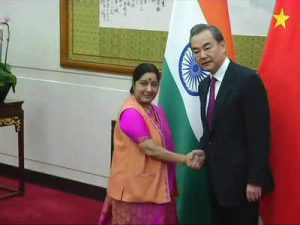
In their congratulatory messages, the foreign ministers of India and China hailed the trilateral cooperation as a new beginning and an important step forward.
“The seeds for joint cooperation in Afghanistan were sown at the meeting between the Prime Minister of India and the President of China when they met in Wuhan in April 2018,” said External Affairs Minister Sushma Swaraj in a message that was read out at a ceremony by Dean, Foreign Service Institute (FSI), J.S. Mukul.
“Today, we see it blooming with the initiation of this training programme. This marks the beginning of what we visualize as a long-term trilateral partnership for the benefit of Afghanistan,” said Swaraj.
In a similar vein, China’s State Councillor and Foreign Minister Wang Yi said: “The launch of this program today marks an important step forward. It reflects the closer coordination and cooperation between our two countries on regional affairs and represents a positive development in China-India relations.”
Terming Afghanistan as a priority partner, Mr Wang said: “China and India have been active supporters of Afghanistan’s peace, and reconstruction process. This Joint Capacity Building Program is an essential part of the international efforts to assist Afghanistan and marks the start of China-India-Afghanistan cooperation.”
“It is a testament to the joint aspiration and endeavor of China and India, both being major, responsible developing countries, to contribute to regional peace and stability,” said Mr Wang, in a message read out by China’s ambassador to India Luo Zhaohui.
Underlining shared interests of India and China in Afghanistan, China’s ambassador to India Luo Zhaohui said that both countries “support an Afghan-led and Afghan-owned peace reconciliation process.”
“Both of us uphold that Afghanistan should realize peace, stability and prosperity. Both of us are against terrorism. China and India are members of Istanbul Process and Shanghai Cooperation Organization,” he said.
“We are talking a lot about the regional connectivity initiatives, such as International North-South Transport Corridor, India-Afghanistan-Iran transit and trade arrangement and China-Pakistan-Afghanistan cooperation. All of these have provided a solid foundation for the current and future cooperation between China and India in Afghanistan.”
Partnering in third countries

Looking ahead, the Chinese envoy expressed hope that in the future days China-India cooperation in Afghanistan will span from training programme to more concrete projects. The envoy stressed on respective advantages of India and China, which could make a decisive difference to stabilisation and prosperity of Afghanistan. “This is just the beginning. China and India have respective advantages. For example, India has remarkable edge in agriculture and medical services, and China in hybrid rice and poverty reduction.”
In a sign of post-Wuhan momentum in India-China relations, the Chinese envoy raised the bar by proposing that “China-India Plus cooperation should be extended from Afghanistan to other countries, such as Nepal, Bhutan, Maldives, Iran and Myanmar.”
“We can also join hands under the mechanisms of SAARC, BIMSTEC and BCIM to promote regional peace, stability and prosperity.”
The envoy’s suggestions for cooperation with India in third countries in the periphery and extended neighbourhood are expected to raise a few eyebrows in strategic circles, who tend to view China’s expanding footprints in the region with concern.
New Optimism

The launch of the joint programme for training of Afghan diplomats has set a positive tone for a series of high-profile engagements between the two Asian powers, which includes the visit of Chinese State Councilor and Minister of Public Security Mr. Zhao Kezhi over the weekend; and China’s State Councilor Wang Yi to India in December for the launch of the People-to-People (P2P) mechanism, another major takeaway of the Wuhan consensus.
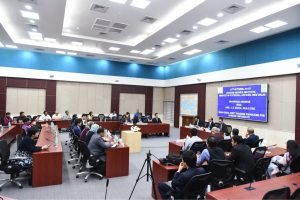
These meetings will culminate in the meeting between PM Modi and Chinese President Xi Jinping on the sidelines of the G20 summit in the Argentine capital Buenos Aires (November 30-December 1), making 2018 an unprecedented year in India-China diplomacy, marked by four meetings between their leaders, setting a future-looking agenda for this crucial partnership. “I am delighted to see that China-India relations are now on a fast track,” said the Chinese envoy, encapsulating a new optimism about India-China relations.
Author Profile

- Manish Chand is Founder and Editor-in-Chief of India Writes Network (www.indiawrites.org) and India and World, a pioneering magazine focused on international affairs. He is CEO, Centre for Global India Insights, an India-based think tank focused on global affairs.
Latest entries
 India and the WorldDecember 12, 2025India-Italy bonding: Tajani’s visit raises the bar for business, maritime ties
India and the WorldDecember 12, 2025India-Italy bonding: Tajani’s visit raises the bar for business, maritime ties In ConversationNovember 26, 2025G20 is a Force for global Good
In ConversationNovember 26, 2025G20 is a Force for global Good articlesNovember 26, 2025Rescuing G20 from North-South divide: Ubuntu Moment
articlesNovember 26, 2025Rescuing G20 from North-South divide: Ubuntu Moment India and the WorldOctober 27, 2025Modi hails the century of India and ASEAN, backs ASEAN centrality
India and the WorldOctober 27, 2025Modi hails the century of India and ASEAN, backs ASEAN centrality

